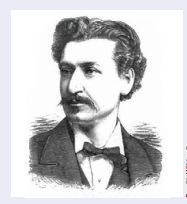Campobasso’s Contributions to Music and Film
Tito Mattei
The city of Campobasso (population 49,230 in the 2017 census) has produced several notable individuals who have made contributions in the areas of music and film. AMHS member Joseph “Sonny” Scafetta, Jr., who serves on the Society’s Board of Directors, has written profiles of three such artists. In this issue, we feature the first of these. Tito Mattei Tito Eduardo Achille Mattei was born in the city of Campobasso in the province of the same name in the region of Molise, Italy, on May 24, 1839. As a musical prodigy, he gave his first piano concert in his home town on September 28, 1846, at the age of seven. Afterwards, he toured Italy, France, and Germany.
In 1852 at the age of 13, Mattei was appointed a Professor of Music at the Accademia Nazionale di Santa Cecilia in Rome. He later served as pianist for King Victor Emmanuel II
Upon his return home to Campobasso, his parents decided to move to Naples where Tito studied with Sigismond Thalberg, Carlo Conti, and Michele Ruta. In 1852 at the age of 13, he was appointed a Professor of Music at the Accademia Nazionale di Santa Cecilia in Rome. After receiving this appointment, he traveled to England where he gave his first piano recital in London. He was so impressed with the city that he vowed to return someday to live there. During 1853, he played before Pope Pius IX who gave him a gold medal. Tito left his professorship when Italy became united in 1861 for an appointment as the pianist for King Victor Emmanuel II. While in the service of the king, he was made a Chevalier of the Order of Saints Maurice and Lazarus. He also joined the Società Filarmonica in Florence.
After two years in the employ of the Italian king, Mattei finally left Italy for England where he became, at the age of 24, the conductor at Her Majesty’s Theatre in London in 1863. Queen Victoria would regularly attend performances there. After he learned English well enough, he became a British citizen. In 1870, he organized and conducted a season of Italian opera at the Lyceum Theatre. At the conclusion of one of his concerts, the 31-year-old Mattei was introduced to another Italian turned British citizen, 25-year-old Amalia Colombo. They married the next year in the Kensington section of London. Their daughter, Marie Jeanette Mattei, was born there in 1875. Mattei wrote several hundred piano pieces and songs which had moderate success, including the ballet “The Spider and the Fly”.
His best songs included “For the Sake of the Past”, “Dear Heart”, “Non torno” (I do not return), “Non è vero” (It is not true), and most famously “Oh! Oh! Hear the Wild Wind Blow!” His Italian operas included “Maria di Grande” and the comic opera “La Prima Donna”. He also contributed ballet music and the song “O Leave Me Not, Dear Heart!” to the burlesque melodrama “Monte Cristo” which played at the Gaiety Theatre in London in 1886. In 1888, he joined the Rothesay Lodge No. 1687 of the Freemasons.
Although Mattei was a successful musician, his repeated stock exchange speculations caused him to be declared bankrupt on June 16, 1900. Consequently, the bankruptcy court forced the sale of his family home and the copyrights to all of his compositions. As a result of this financial setback, his wife and daughter left him. Mattei then relocated to a rooming house where he lived alone as a lodger in the Paddington section of London for the rest of his life. He died there penniless on March 30, 1914, about two months shy of his 75th birthday.
❚ Sources, all accessed January 10, 2021:
/Tito_Mattei prabook.com/web/tito.mattei (link expired)


